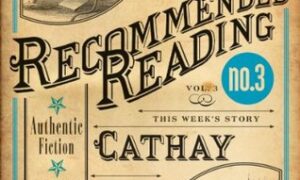 Floating Boy and the Girl Who Couldn’t Fly by Stephen Graham Jones, Paul Tremblay
Floating Boy and the Girl Who Couldn’t Fly by Stephen Graham Jones, Paul Tremblay
My rating: 3/5 cats



it’s no secret that i love both czp and paul tremblay, who is 1/2 of this p.t. jones person. or, rather, pseudonym—i don’t think they have actually been fused together. yet.
and i am very excited that czp has created the chiteen imprint and are branching out into the YA-verse, bringing their trademark dark fantasy and incredible covers to a younger audience. this is the premier title in that endeavor (although they seem to have retroactively added three of their older titles to the chiteen imprint-carousel on their site)
but like all heroic endeavors in their early stages, there are some kinks to be worked out. to the best of my knowledge, neither of these authors have ever written for a YA audience before, and might be working off an older rulebook. YA authors like John Green and Melina Marchetta have really raised the sophistication bar for teenlit, and have fostered certain expectations in how characters think and talk and act that is likely unrealistically adult, but has become the norm, and with this one, i found the voice a little problematic. mary is meant to be fifteen, but both she and her friends read much younger, and her decisions don’t seem to be realistic as much as story-driving.
but, i mean—it’s a story about an epidemic of floating children, so as long as you can accept that we are dealing with a fantasy world, and treat its events like the events of a fantasy world, you should be fine.
so, mary was at the birthday party of her younger cousin, where she witnessed a strange boy who ate all the doritos and then suddenly started floating away into the air, after bursting through the piñata-mad crowd and leaving dorito-handprints all over the other kids.
everyone sees him floating, and stunned confusion and wtf abounds, but they are soon easily-assuaged by a cover-up news story in which the incident is written off as a balloon-man’s prop. it makes more sense when they tell it.
but then, other kids in town start floating as well.
mary’s just coming off of a series of anxiety-attacks that immobilized her to the point of not wanting to get out of bed, passing her time with godzilla movies and stuck in her own head. this anxiety is cited as her reason for not mentioning to her parents the fact that she found her younger brother floating on the ceiling while babysitting him—she didn’t want them to think she was relapsing and try to medicate her with zombie pills. instead, she tied his leg to his crib with a bathrobe belt and just ostriched herself away from the situation, preferring to investigate on her own, despite the fact that other kids in town were floating, so it’s pretty clear that she wasn’t making the whole thing up.
but again—fantasy world, fantasy solutions to fantasy problems.
mary investigates the floating epidemic as it begins to take over the children of the town from the very young to her own friends, even though she herself seems to be unaffected, which causes her a great deal of confusion, shame, and anxiety about her anxiety.
however, her anxiety disorder is treated more as a background element than explored with any depth which is a shame, because books that take on real-life problems that kids face wrapped up in fantasy clothes can be really effective in helping kids address their problems by acknowledging that they are fairly common, and it can be comforting. mary doesn’t really act like someone who has recently gone through a psychological ordeal, and with everything that is happening to her in the meat of this story, it seems like she would have experienced a more dramatic relapse. there’s a kind of holding-back here, maybe a hesitancy to explore issues that might cause discomfort to a young audience? so it’s just a small missed-opportunity criticism.
but overall, it’s an enjoyable fantasy story with a mad scientist and embarrassing relatives, and changing relationships and some nice protective qualities in mary towards her little brother, when she is otherwise pretty caustic and sarcastic.
it’s fun and light, but i do think this is better steered towards younger teen or even strong-reading middle grade readers. the ultimate message is also appropriate for a younger audience—that whole idea of not being jealous of other people for their special skills because everyone’s got some hidden talent and you will find yours. teens need just the opposite advice; they have already accepted that they are the most special and important thing in the universe and the next developmental rung on the socializing ladder is to rein in that overweening self-confidence and remind them that other people exist and we’re all part of a grand mosaic or whatever.
but—floating kids!
that’s good enough for me!
read my book reviews on goodreads







